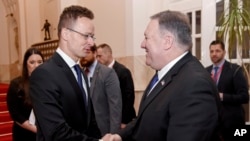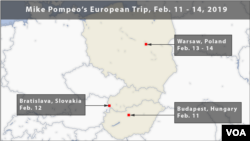U.S. Secretary of State Mike Pompeo warned Hungary that Russia is seeking to divide the West, saying the United States should not let Russian President Vladimir Putin "drive a wedge between friends and NATO."
Speaking on Monday in the Hungarian capital, Budapest, Pompeo also said that the United States has not done enough to be engaged in central Europe and wants to do more going forward.
Pompeo's Hungarian counterpart, Peter Szijjarto, said any criticism Washington has of Hungary's diplomacy with Russia is misguided as other European countries are also involved in energy deals with Russia. He also said that Budapest is fulfilling its obligations to Western nations as a member of the NATO military alliance.
Hungary gets most of its gas from Russia and the Russian state corporation Rosatom is involved in a multi-billion dollar project to expand Hungary's Pak nuclear power plant which provides much of Hungary with electricity.
U.S. officials say Pompeo's tour to central Europe, which will also include stops in Slovakia and Poland, is an attempt to re-engage in a region that has seen a growing engagement by Russia and China.
Pence warned U.S. allies against allowing Chinese telecom giant Huawei to build communications infrastructure on their soil. The Chinese company has recently increased its operations in Hungary and Poland and U.S. officials are worried that Huawei's equipment could be used for espionage.
"What is imperative is that we share with them the things we know about the risks that Huawei's presence in their networks present -- actual risks to their people, to the loss of privacy protections for their own people, to the risk that China will use this in a way that is not in the best interest of Hungary,'' Pompeo said.
Huawei denies being involved in any intelligence gathering for the Chinese government.
Pompeo said the United States shunned central Europe in the recent past which led Russia and China to fill the void in engagement.
"I think for a long time we shunned them in a way that drove them to fill the vacuum with folks who didn't share our values,'' he said. ``The Russians and the Chinese ended up getting more influence here, they do not remotely share the American ideals that we care so deeply about."






